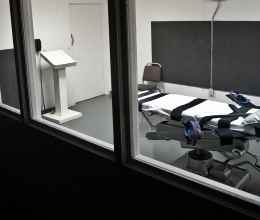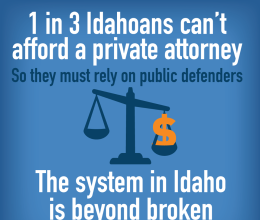
Delbert came to Idaho in 2017. It was his one day trip to the state that resulted in his arrest and incarceration. He served 18 months in prison for possession of a controlled substance and carrying a 9mm gun in his car. He has approximately nine and a half years of parole left. Delbert is committed to turning his life around. After submitting multiple job applications and not even getting called in for an interview, he finally landed a job at Home Depot. In the nine months he has been there, he has been recognized as employee of the month and has received all sorts of awards and bonuses for his great work ethic. Delbert mentioned how the support at the IMSI Hope Community Phase II reentry center, his faith, and sheer determination played a big role on getting back on his feet and becoming the person he is today.
What was your first interaction with law enforcement?
Oh my goodness I’ve been in and out of trouble with the law for over 40 years, so the first one was for fighting, I was in 7th grade, I think it was, and somebody called me an SOB well I had just lost my mom from cancer so nobody was about to call me an SOB so I chased him all the way back to his house, broke the window, went through the door, and proceeded to beat him up, that was my first experience with the law.
What was your experience after you got out of prison and reintegrating back into society?
The barriers were overwhelming. I didn’t have an ID, I didn’t have a birth certificate, I didn’t have social security card, and I didn’t have any clothes. All I had was the clothes that I was released in. So I didn’t have any way to get around, transportation, nothing. So it was pretty overwhelming, and I have to say that it was only because of places like IMSI reentry that I was able to succeed and get to where I am today. Because it was a place for me to find refuge, it was a place that I was able to find clothes, and able to find a way to get from here to there, and to find where there was. Because I knew nothing about Boise, I was there one night, left, and got arrested. So my knowledge of places to go, and things to do to stay safe was very minimum, and by the grace of God, he put me where I am. It took me almost five months to get a job. I’d had over $1500 racked up in rent, so it was only because of sheer determination and the help from the people here at IMSI that I was able to stay clean and sober.
Was finding employment difficult for you?
I had put in application after application after application. I probably had 30 to 40 applications put in. I never heard a single word back from any of these places. I feel that a lot of it had to do with having to checkmark “yes, I’m a felon.” And then they go on and ask you, “Why are you a felon? What did you do? What was your crime?” I had to put down drugs and a gun. That’s really hindering to getting a job because nobody wants to give a person like that a chance because of the stigma.
When you finally got called for an interview, how did that process look like?
I had four interviews with [Home Depot]. They kept calling me back and calling me back. They never once asked me about my conviction or what that was about. Without them having that knowledge I was able to present myself as a human being just like any other person who had never been in jail does. I think with that in mind, if a person believes in themselves and wants to change, they’re going to change. The behaviors are what keeps you stuck in that cycle. I believe that it was a total God thing that I even got this job at Home Depot. Since [I’ve been employed], I’ve gotten associate of the month, I’ve gotten all kinds of awards, I’ve gotten bonuses.
How important or crucial do you feel like employment is after you get out of prison?
It is probably the most important thing for a person to start building that self-respect and start getting back on your feet, being able to take care of yourself, being able to pay the bills, being able to get a phone. All of that stuff is a huge part of the rewards of having a job. Without a job, how will you pay rent? How will you buy your food? You can’t. So then you are always relying on somebody else to do it for you, and that makes me feel less than and it makes me feel like I’m not a very good person. [With a job], I am able to take care of myself. I’m able to feel better about who I am and what I’m doing in life.
If there were reforms on criminal convictions, particularly on drugs, how would that have affected you personally?
I’ve been in five or six different residential treatment centers, and none of it ever worked. I didn’t want to change in that point in life, so it’s hard to say when a person has had enough. When is a person ready to change? Only God knows the answer to all of that. Faith is huge.
Why is criminal justice reform important to you?
I believe that there are some people that need to be where they are at. There are some people that need to be in prison, but there are also a lot of people that don’t really need to be there that are there. I think that if they can change some of these laws and make it easier for people getting out of prison to change, make it easier to get their needs met, get a job, get clothing, because that is really overwhelming when you get out and you have nothing and you know nobody. So what do you do? Do you try to change or do you try to do things the way you’ve always done them? Once you get into that cycle you’re stuck. It’s really a place where you get so stuck that you can’t see outside that box; you are in that box and all you see is those blurred walls closing in on you.

